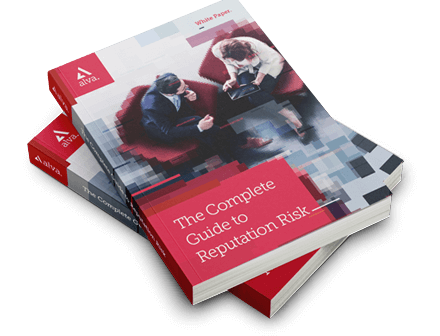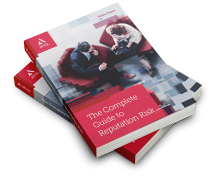Know your customer, know your reputation exposure
The FCA this year handed down its second largest penalty ever for anti-money laundering infractions – £102.2M, among a series of high-profile cases over the past twelve months as regulators globally increase the pressure on the veracity of the financial services industry’s Anti-Money Laundering / Know Your Customer practices. On a global basis, 2019 already looks set to come close to, if not exceed 2014’s total AML fines at US$10.89B, the largest on record, according to recent research.
While the regulatory reprimands and monetary penalties resulting from AML / KYC breaches are substantial, the repercussions of such events for financial institutions are not just restricted to these.
Wider, non-financial impact
The immediate effects of negative media coverage on share price is well-documented, but the impacts often occur over much longer time horizons.
The longer-term and more wide-ranging consequences of regulatory breach or misconduct on reputation, and both consumer and investor confidence, should not be underestimated. At their most extreme these can be monumental.
Take for example the case of AIG in the US$182B taxpayer bailout which precipitated from the global financial crisis. While not a case of AML, the AIG case is one where systemic failures led to near collapse of an institution, and one that highlights the lasting impact of high-profile incidents on corporate reputation – to the extent that AIG felt it necessary to rebrand to Chartis.
The brand was felt to have been so tarnished as to necessitate an identity change to create distance from the situation (they since deemed the dust settled three years on and seen it fit to revert back to the AIG brand).
Reputational exposure also extends to individuals, given the impacts of money laundering on society – with links to organised crime, terrorist financing, drug and arms dealings and human trafficking – there is a burden on individuals within organisations to ensure they are acting with integrity and within the law, or risk criminal proceedings.
The National Crime Agency’s Flag It Up campaign promotes best practice in anti-money laundering and the timely reporting of suspicious activity. The agency receives over 460,000 suspicious activity reports every year.
Compliance as a reputational asset
This is not purely a matter of damage limitation. Managed well, issues of regulatory compliance can also translate to value creation.
As Forbes indicates, not only can lack of compliance lead to substantial fines, the converse – strong compliance – can be a positive influencer of customer and investor choice. In today’s hyper-transparent society which increasingly holds corporations to account, a strongly compliant institution may hold a competitive advantage over its peers, particularly against the backdrop of a sector suffering from more frequent and larger high-profile breaches.
The industry clearly has cause for focusing significant attention and resource on this. The impact of money laundering on the UK is estimated to exceed £100B each year, according the National Crime Agency. In response, financial institutions globally are reportedly spending US$48M on AML / KYC compliance and this will only continue to rise (Forbes).
But what of the reputational damage, and its knock-on effect on shareholder value?
How much visibility do these same institutions have of their corporate reputation and how prepared are they to both track and deal with the aftershocks of a breach?
Those who have sufficiently stocked their arsenal to address these have better chances of riding out these potentially stormy waters.
Be part of the
Stakeholder Intelligence community











